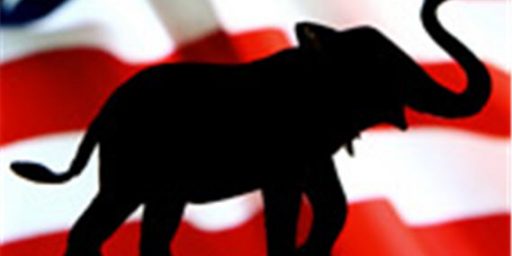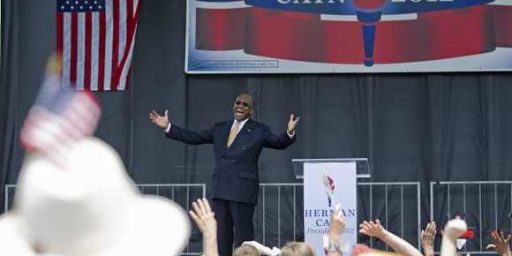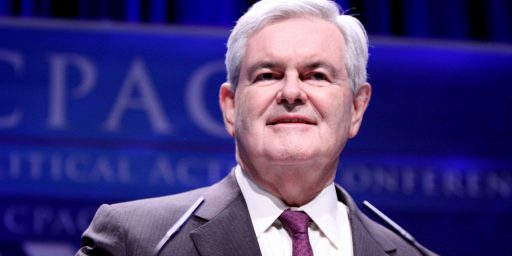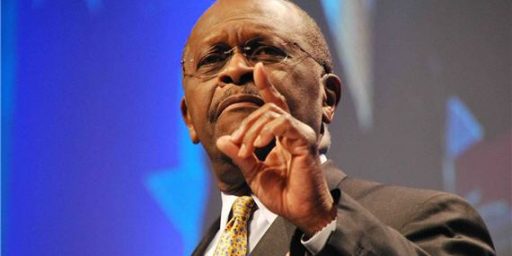Romney well Ahead in NH Poll
Romney remains the clear front-runner in NH in a post-debate poll.
 Via the NH Journal: Poll: Bachmann breaks through, Huntsman hurting, Romney rolling
Via the NH Journal: Poll: Bachmann breaks through, Huntsman hurting, Romney rolling
Romney leads all contenders with 42% of the vote. Texas Congressman Ron Paul and Bachmann are tied with 10% each. Former Alaska Gov. Sarah Palin earns 7% while former NYC Mayor Rudy Giuliani earns 6% followed by former Minnesota Gov. Tim Pawlenty who gets 5%. Four percent say they would vote for Newt Gingrich while Herm Cain and former Obama official Jon Huntsman both earn 3%. Rick Santorum gets 2%.
[…]
This survey was conducted among 727 likely 2012 New Hampshire Republican primary voters, and independent voters that are likely to vote in the 2012 Republican Presidential primary. The interviews were conducted June 14th – 15th, 2011. This survey has a margin of error of +/- 3.63% at the 95 percent confidence interval.
It is not a surprise that Romney is in first place. I do think, given at least the commentariat’s hypothesis that he is a weak frontrunner, that it is noteworthy how far ahead that he is at the moment. Although I suppose the counter to that statement is that the general weakness of the field is why some folks are hoping for Rick Perry to jump into the race.
I would point out that despite some buzz over the last couple of weeks, Herman Cain is in the cellar, numerically speaking. Indeed, it has to depressing to several of the candidates that they are out polled (albeit only by a few points) by candidates who have not declared and were not at the debate (although, granted, Palin and Giuliani have clear name recognition advantages).
If you look at the poll itself, one number that jumps out: Newt Gingrich’s unfavorable number is a whopping 62% (with only 29% favorable). If there is a zombie in this field (i.e., a example of the walking dead) in this field, it’s Newt.
Meanwhile, Huntsman’s favorable is only at 14% and his unfavorable at 36% (and his hard name ID is only at 50%).
Here is the PDF of the poll:






Some Republicans wish the timing were better for Chris Christie and/or Bobby Jindall. But as Rummy says, “you got to war with the army you have” (I figured I could use a war analogy since the Democrats dropped the “new civil tone” thing in recent months).
Besides, Mr. Taylor, the Republican field is “weak” compared to what? Barrack Obama? Also, hypothetically, if Obama were not a candidate in 2012, what other Democrats would represent “strong” candidates? Joe Biden? A rapidly aging Hillary Clinton? Andrew Cuomo? Deval Patrick? Kirsten Gillebrand? Claire McCaskill? Debbie Wasserman-Schultz?
Every generation believes that today’s politicians (or baseball players, or move actors, or . . .) are lacking compared to those in the past (and sometimes they’re right).
But I’ll make a deal with you: when one of the mediocre Republians is elected, you and I can both agree that the new president would be incapable of “fixing” our problems via piecemeal social democratic economic planning; and, more generally, we shouldn’t expect much from a government that would run by such a mediocrity, correct?
@Patrick:
“Weak” in terms of their likelihood of winning next year.
And, of course, if the Democratic field were different, the calculus would be different. And, for that matter, there would likely be a different GOP field if the nomination was for running for an open seat.
In regards to the rest of your comment, you will need to further clarify your point, as I am a bit unsure as to what you are getting at.
Romney I think has better chances in the general than he does in the primaries. We’ll see if the GOP manages to shoot themselves in the foot by knocking him off in favor of someone like Bachmann (*giggle*, sorry the idea of MB actually being a front runner makes me titter).
I think she is aging at the same pace as the rest of us. And age is now an impediment? Someone should’ve told that to Reagan. And McCain and Bob Dole.
You don’t understand, Neil. In right-land, the sole criterion for determining the worth of a female politician is hotness. That’s why they love Sarah Palin, and now that her looks are fading they are switching over to Michelle Bachmann. Doesn’t matter that one is a moron and the other insane — they’re better looking than Hillary Clinton, so they’re presidential material.
This sue is gonna be a dull election season if Mittens wins it early.
Neil Hudelson: it goes without saying (usually, anyway) that the phrase “rapidly aging” is meant figuratively, not literally.
My comment about H. Clinton was in response to Professor Taylor suggesting that the Republican field is “weak. The professor has since clarified that he meant the candidates are weak “in terms of their liklihood of winning next year.” Perhaps unfortunately, a politician’s electoral prospects might be lowered by signs of aging, among other factors.
In my hypothetical situation (assuming no Obama in 2012), I wasn’t suggesting that H Clinton couldn’t win, or that she’d govern poorly, as a result of her age; but IMO I doubted that she’d be perceived as being as dynamic, compelling, etc., as she was a few years ago. I perceive Hillary Clinton as having become an “old,” grizzled looking 63 years old (of course, I’m biased against her). As a 2012 candidate, she’d have run to enter office at 65 years old.
You’re right, Reagan was even older, but Reagan had great charisma, a youthful “spirit”/temperament, etc. Of course, this is all heavily dependent on one’s own perceptions, biases, etc., but then so was Professor Taylor’s contention that the Republican field is “weak.”
@Patrick:
Well, no. My view on the relative weakness of the field is a combination of assumptions (based on historical patterns) about the re-election chances of incumbents coupled with the President’s generally solid (albeit not stellar) approval numbers and the polling of the candidates in question. Further, there are considerations about the way the electoral college map shapes up for various potential candidates.
I am not making this assessment based on my preferences, but rather on what I think is a likely outcome given the facts at the moment.
Obama is vulnerable, given the state of the economy. However, I don’t see much evidence at the moment that most of the candidates in the GOP field have much of a chance to win in Nov of 2012, save perhaps Romney, but even then, I have my doubts.
@Professor Taylor:
Thanks for the clarification (“‘Weak’ in terms of their likelihood of winning next year”). In other words, you were not so much evaluating the independent qualities of the candidates, in a vacuum, as you were gauging their prospective competitive strength(s) against Obama.
On that basis, you might perceive the independent qualities of the Republican candidates to be quite strong, except that you consider Obama to be that much stronger.
So, the better question is how strong of a candidate do you consider Obama?
To clarify my other point/question: in the highly unlikely event that one of the mediocre Republican candidates manages to win in 2012, to what extent would that freak outcome reduce your confidence in the federal government? And, if your confidence in the federal were significantly lowered, perhaps you would then join me in spreading the word that we should not have such high expections in the federal government to “manage” the economy?
@Patrick:
Two thoughts:
1) This really has nothing to do with the relative electoral strengths of the various candidates (Ds or Rs).
2) Since I have expressed no confidence, one way or another, in the federal government, as such I am not sure what that has to do with this topic of discussion.
@Professor Taylor:
Thanks for clarification #2 (comment at 12:56 above). Excellent points, yet we’ve really only had, what, 2 or 3 presidential elections in the “internet age” (depending on how we define that phrase), and this will be only the second election since the financial crisis.
No doubt, the historical trends & polling data are in Obama’s favor. Sorry, I didn’t realize that’s what you were emphasizing when you referred to the Republican field as “weak.”
Then again, most of these factors tell us a lot more about the historical strength of (generic) incumbents, than they do the “relative weakeness” of the 2012 Republican field.
You wrote, “Obama is vulnerable . . . [but I] don’t see much evidence at the moment that most of the candidates in the GOP field have much of a chance to win in Nov of 2012.” Your analysis relies heavily on historical patterns (generic re-election chances of incumbents, generic “benchmark” approval numbers). So, if Obama is “vunerable” in the abstract, but “strong” under actual 2012 conditions, are you suggesting that the 2012 Republican field really is so unusually “weak” (by historical standards) as to make the vulnerable (historically speaking) Obama highly likely to win?
Okay, but then I still can’t appreciate how you arrived at the conclusion totally divorced from perceptions, biases, etc. Oh, yeah, you looked at polling data 17 months before the general election . . .
@Patrick:
Well, as you may have noticed, my OTB colleague has a post up today that shows while Obama polls well against “generic Republican” he still polls quite well against all the likely candidates (links in the piece–just go to the main OTB page and click through). I am going with the evidence I have at the moment. While I am not sure what you exact point is (save I get the impression that you would prefer that Obama not be reelected, which is fair enough).
Here’s the deal: I have a hard time seeing any of the current field, save Romney, having a competitive chance against Obama at the moment–that would mark the field as “weak” in an electoral sense, yes? And, to be fair, “perceptions” do come into that assessment. (What I was rejecting above was the notion that my views on the candidates were motivated by my personal views, as you clearly indicated was the case in regards to your view of HRC).
Out of curiosity, which of this current field do you think has a legit chance of being competitive in 2012?
BTW: I am hardly the only one saying that the field of GOPers is weak–there is reason that there is a lot of interest in Rick Perry running.
@Professor Taylor:
Also, in my defense, I haven’t had the pleasure of regularly reading your posts, so my introduction to your assessment of the Republican field was your above post: “Although I suppose the counter to that statement is that the general weakness of the field is why some folks are hoping for Rick Perry to jump into the race.”
In that type of context, it’s difficult to separate the purely predictive/descriptive social science from normative politics. If some folks “hope” that Perry jumps into the race because they perceive the Republican field to be “generally weak,” who would hope such a thing and why? Presumably, those with such hopes want Perry to ultimately win the election not just for the sake of winning – and not just to make a correct social scientific prediction; moreover, some of them might perceive Perry to be “stronger” not just as an electoral candidate, but as a potential president/executive/commander-in-chief/etc., which is the ultimate purpose of the election.
I see now that you really intended to remain aloof from such normative concerns, but can you see how I might have had a different initial impression?
@Patrick:
Yes, I am speaking wholly in terms of electoral strength and weakness (as terms relative to their ability to win elections).
In regards to Perry, my observation is that there are some conservatives who would like to see Perry enter the race because they believe he has a better chance to beat Obama coupled with the ideological credibility to win the primaries. I am sure that many of them also prefer his ideological positions to those of Romney.
@Professor Taylor:
Good questions and thanks for being patient with me. I just don’t believe that, when assessing the relative weakenesses of candidates, that projected electoral strength – 17 months before the election – can be cleanly separated from strength as a potential leader, executive, decisionmaker, etc.
For one thing, a candidate that has an abundance of good qualities might begin the campaign with low name recognition, low poll numbers, historical handicaps, etc., but might very well have the ability to make his or her own numbers. At this phase in 1991, your critieria would have projected Bill Clinton to have very little chance to win the 1992 election. Yet, Bill Clinton was a very strong candidate in 1991 even if few people realized it.
Honestly, I don’t see any candidates in the Republican field who are capable of campaigning as effectively as Bill Clinton or Reagan, but then I see Obama as weaker (both as a president and as a 2012 presidential candidiate) than your analyses would suggest. Of course, it depends on the economy.
Assuming a double-dip, whatever Republican wins the nomination will defeat Obama.
Assuming a status-quo economy: Romney (who I don’t like) or Perry would defeat Obama; less likely, but possible, is Bachman.
Assuming an economic rebound, Obama wins unless one of the Republican candidates is much stronger than I envision.
Normatively, I’m not sure who I prefer yet.
@Patrick:
I will readily allow that circumstances can change, and therefore this is a speculative conversation.
It would appear that we largely agree on the strength of the GOP field at the moment, i.e., that Romney has the best chance of those in the race. I am skeptical that Bachmann would be anything other than an electoral disaster for the GOP, but we shall see.
That is something that no one should ever have to apologize for…
Something else to laugh about is the fact that anyone would be upset that the current GOP presidential field is characterized as weak…correct me if I’m wrong, but haven’t there been polls of Republicans showing them to be lukewarm towards this group and seemingly yearning for someone else to enter the field?
Talk about coming to a conclusion based on perceptions, biases, etc….what evidence exists that proves that Perry could win against the president assuming a status-quo economy or that Bachmann could defeat the president under any circumstances…
@Interested Parties:
It was so perceptive of you to discover that my conclusions were partly based on perceptions, biases, etc., since I clearly, boldly stated exactly that right up front (my conclusions also drew on gut instincts, personal observations, and my knowledge of American history).
For “evidence,” Professor Taylor was largely relying on generic past trends pertaining to presidential elections, which can help to create useful but far from perfect models, and polling data 17 months before an election. I think I proved in the thread above that Professor Taylor also could not have arrived at his conclusion that the Republican field is “weak” – again, 17 months before the election – without also relying on his biases, perceptions, instincts, etc., but I don’t expect anyone on this site to acknowledge that (btw, the Republicans who agree with Professor Taylor wouldn’t deny that they’re partly, or largely, relying on such unscientific analyses and thus they don’t really represent “evidence” in his favor).
The assertion that the Republican field is weak (17 months before the election) is perfectly reasonable and maybe even persuasive; nontheless, the idea that such an assertion (which, for all intents and purposes is really a prediction) could be adequately buttressed by “evidence” in the same way that we’d make social scientific claims about the past or present is an abuse of the idea of “evidence.”
Here’s my evidence: I’ll wager that, if the unemployent rate is at above 9.0 percent in November 2012, the Republican nominee defeats Obama.
@PGlenn: No need to be pissy…the botton line is your conclusions are worth about as much as you seem to think of Taylor’s conclusions…
@Interested Party: In other words, YOU (unlike Professor Taylor) have absolutely nothing. So why run your mouth in the first place?
@PGlenn: Once again, and to answer your question, the point is that your “evidence” is as faulty as you claim Taylor’s evidence is…a tad more than “absolutely nothing”…